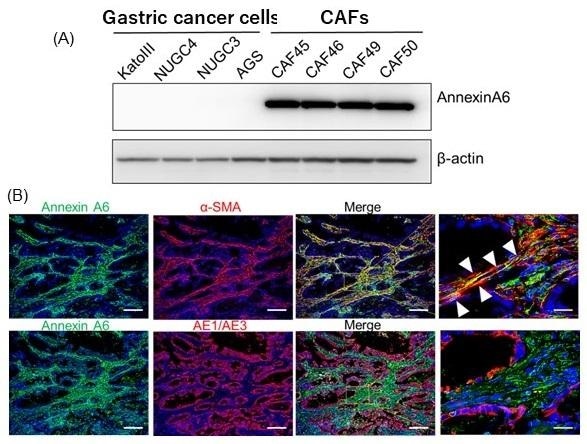Headed by Kumamoto University (Japan), a collaborative study has identified a novel mechanism for anticancer drug resistance in gastric cancer.

(A) The expression level of Annexin A6 protein in gastric cancer cells and CAFs. Annexin A6 is expressed only in CAFs. (B) Fluorescent immunostaining in tissues from gastric cancer patients. AnnexinA6 (green) is consistently expressed in cancer-associated fibroblasts (CAFs: upper red) (yellow region in merged figure). However, it is rarely expressed in cancer cells (lower red) (yellow areas are barely visible when merged). Image Credit: Dr Takatsugu Ishimoto.
Scientists discovered that a molecule called Annexin A6 found in extracellular vesicles (EVs) is discharged by cancer-associated fibroblasts (CAFs) and used up by gastric cancer cells, causing resistance to anticancer drug treatments.
This discovery presents new opportunities for developing novel drugs that target the Annexin A6 molecule as well as CAFs.
Gastric cancer is known to be the second most common condition in Japan. In particular, treatment for advanced gastric cancer involves numerous anticancer medications but they often do not adequately enhance medical disorders.
The microenvironment of the tumor denotes the area around cancer cells containing numerous cells and support systems—both biochemical and physical.
Inside this microenvironment, CAFs secrete various factors to improve the malignant transformation of cancer.
Our research found that higher amounts of CAFs in tissues resulted in worse conditions for gastric cancer patients. This was also true in patients with advanced gastric cancer who had been treated with anticancer drugs. Based on this, we wondered if there was some factor derived from CAFs that induced anticancer drug resistance.”
Dr Tomoyuki Uchihara, Kumamoto University
In a cell experiment that approximates the conditions of a living human body, gastric cancer cells that were grown with a culture of CAFs acquired resistance to anticancer drugs. Using gene expression analysis in gastric cancer cells, the team found that the Annexin A6 molecule derived from CAF-EV played a vital role in the resistance of gastric cancer cells to anticancer drugs.
EVs are essentially small sacs of material enclosed by lipid bilayers or membranes that are discharged from cells and play a significant role in transmitting information between cells.
The team also identified that the Annexin A6 molecule is seldom expressed in gastric cancer cells themselves and is often present only in CAFs.
This demonstrates that the Annexin A6 molecule is involved in acquiring resistance to anticancer drugs by being taken up by gastric cancer cells through EVs. Additional experimental outcomes have implied that the Annexin A6 molecule contributes to anticancer drug resistance by stabilizing “β1 integrin”—the cell adhesion molecule—on the gastric cancer cell membrane and triggering FAK-YAP signaling once it is taken up by gastric cancer cells.
Here we showed that CAF-derived Annexin A6, which surrounds gastric cancer cells, causes resistance to anticancer drug treatments. As the research progresses, new drugs targeting Annexin A6 and CAFs in gastric cancer are expected.”
Takatsugu Ishimoto, Associate Professor and Research Team Member, Kumamoto University
Source:
Journal reference:
Uchihara, T., et al. (2020) Extracellular Vesicles from Cancer-Associated Fibroblasts Containing Annexin A6 Induces FAK-YAP Activation by Stabilizing β1 Integrin, Enhancing Drug Resistance. Cancer Research. doi.org/10.1158/0008-5472.CAN-19-3803.